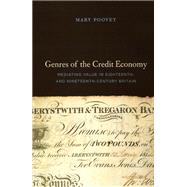Genres of the Credit Economy
, by Poovey, Mary- ISBN: 9780226675336 | 0226675335
- Cover: Paperback
- Copyright: 4/1/2008
How did banking, borrowing, investing, and even losing moneyin other words, participating in the modern financial systemcome to seem likeroutine activities of everydaylife?Genres of the Credit Economyaddressesthis question by examining the history of financial instruments and representations of finance in eighteenth- and nineteenth-century Britain. Chronicling the process by which some of our most important conceptual categories were naturalized, Mary Poovey explores complex relationships among forms of writing that are not usually viewed together, from bills of exchange and bank checks, to realist novels and Romantic poems, to economic theory and financial journalism. Taking up all early forms of financial and monetarywriting, Poovey argues that these genres mediated for early modern Britons the operations of a market system organized around credit and debt. By arguing that genre is a critical tool for historical and theoretical analysis and an agent in the events that formed the modern world, Poovey offers a new way to appreciate the character of the credit economy and demonstrates the contribution historians and literary scholars can make to understanding its operations. Much more than an exploration of writing on and around money,Genres of the Credit Economyoffers startling insights about the evolution of disciplines and the separation of factual and fictional genres.






